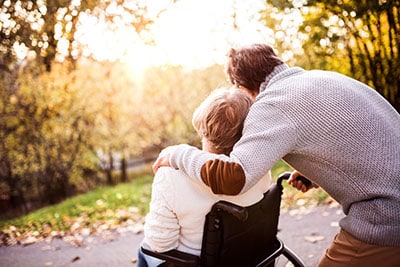Caring for Yourself When Caring for Another
Self-care Isn't Selfish
You are a caregiver if you care for someone who needs help. Caregiving can be hard on you despite the great sense of reward you may feel. To continue being a good caregiver, you need to take care of yourself. One way you can do that is to make sure you have consistent breaks from your caregiving responsibilities. This is called respite. Short breaks can be a key part of maintaining your own health.
What is Respite Care?

You are a caregiver if you are caring for someone who needs help. Taking short breaks can be the key to maintaining your own health.
Respite care allows the caregiver some time off from their caregiving responsibilities. It can take the form of different types of services in the home, adult day care, or even short-term nursing home care so caregivers can have a break or even go on vacation. Research shows that even a few hours of respite a week can improve a caregiver’s well-being.1 Respite care may be provided by family, friends, a nonprofit group, or government agency. Some of these services may be free or low-cost.
Family and Friends
Make Your Needs Known
Here are some suggestions for getting help from people you know.
- Identify a caregiving task or a block of time that you would like help with. Perhaps there’s a book club meeting you’d like to go to that you’ve been missing because of your caregiving responsibilities. Be ready when someone says, “What can I do to help?” with a specific time or task, such as, “It would be really helpful for me if you could stay with Mom Tuesday night so I can go to my book club for 2 hours.”
- Be understanding if you are turned down. The person may not be able to help with that specific request, but they may be able to help another time. Don’t be afraid to ask again.
- If you have trouble asking for help face to face, try writing an e-mail to your friends and family members about your needs. Set up a shared online calendar or scheduling tool where people can sign up to provide you with regular respite.
Your Doctor or Other Health Care Provider
Does your doctor know you are a caregiver?
- You have special needs as a caregiver that your doctor should be aware of. Be sure to let your doctor know if your caregiving responsibilities are making you feel depressed or anxious. Health care professionals may also know about support groups offered in the community.
- Let your doctor (or your care recipient’s doctor) know that you need help finding respite care. A doctor may be able to write you a “prescription” for respite services via Medicare’s PACE program. PACE services are available to Medicare and Medicaid beneficiaries in some states.
Nonprofit Organizations or Government Agencies
Here’s how to get back some of your “me time”.
A great source for respite services is the Area Agencies on Aging. Check the website for the agency in your area. Other resources include:
- Organizations that advocate for people with specific diseases. If you care for someone with Alzheimer’s disease, heart disease, cancer, or lung disease, respite care services may be available from the following organizations.
- National Respite Locator. This resource can help you find adult day care and other respite services.
- CDC’s free Complete Care Plan [PDF – 1 MB] and other caregiver resources.
Especially for Veterans
The Department of Veterans Affairs offers respite resources for veterans or their spouses.
Still Not Able to Get a Break?
Consider joining an online support group. It’s important for you to have an opportunity to share your experiences with others in similar circumstances and to get support and new resources from them.
- Family Alliance on Caregiving—The Caregiver-online support group is an unmoderated group for families, partners, and other caregivers of adults with disorders such as Alzheimer’s, stroke, brain injury, and other chronic debilitating health conditions. The group offers a safe place to discuss the stresses, challenges, and rewards of providing care for another.
- Caring.com Resource Center—Offers key resources to help you better navigate caregiving and access to online support groups, such as the Alzheimer’s Caregiver Support Group.
Remember—To be an effective caregiver, you must take care of yourself. Your care recipient is counting on you.
1Zarit, S.H., Whetzel, C.A., Kim, K., Femia,E.E., Almedia, D.M., Rovine, M.J., Klein, L.C. (2014). Daily Stressors and Adult Day Service Use by Family Caregivers: Effects on Depressive Symptoms, Positive Mood, and Dehydroepiandrosterone-Sulfate. American Journal of Geriatric Psychiatry, 22 (12), 1592-602.